Related Research Articles

Hamid Karzai is an Afghan politician who served as the fourth president of Afghanistan from July 2002 to September 2014, including as the first elected president of the Islamic Republic of Afghanistan from December 2004 to September 2014. He previously served as Chairman of the Afghan Interim Administration from December 2001 to July 2002. He is the chief (khān) of the Popalzai Durrani tribe of Pashtuns in Kandahar Province.

Ahmed Wali Karzai was an Afghan politician who served as Chairman of the Kandahar Provincial Council from 2005 until his death. He was the younger paternal half-brother of former Afghan President Hamid Karzai and an elder of the Popalzai tribe. Wali Karzai formerly lived in the United States, where he managed a restaurant owned by his family. He returned to Afghanistan following the removal of the Taliban government in late 2001. He has been accused of political corruption and was allegedly on the CIA payroll. He was assassinated by one of his close bodyguards, Sardar Mohammad, on 12 July 2011.
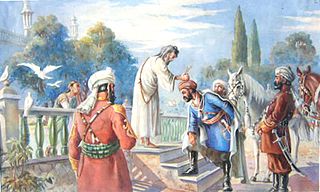
Popalzai or Popalzay, also known as Popal, are Durrani Pashtuns of Afghanistan. The Popalzai are part of the Zirak confederation of Pashtun tribes. The origin of the Abdali forefathers of the Sadozai tribe is probably the Hephthalites. The forefathers of Ahmad Shāh Durrānī, the founder of the Durrani Empire, were from the Sadozai tribe which is a subtribe of the Popalzai. According to Mohan Lal, the Zirak line begins with Sulaiman Zirak Khan, who was the father of Popalzai, Barakzai, and Alakozai. The tribe's origin is Kandahar, Afghanistan. The majority of the Popalzai live in the southern areas of Afghanistan such as in Kandahar, Helmand or Uruzgan. Some members of the Popalzai tribe have migrated with their families to the European Union, North America, and Oceania. Notable members of the Popalzai tribe include Hamid Karzai and his extended family, Karim Popal, Naim Popal, and Khalida Popal.
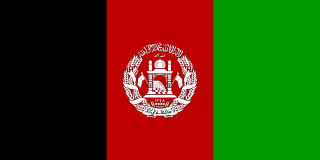
The Transitional Islamic State of Afghanistan (TISA), also known as the Afghan Transitional Authority, was the name of the temporary transitional government in Afghanistan put in place by the loya jirga in June 2002. The Transitional Authority succeeded the original Islamic State of Afghanistan, and preceded the Islamic Republic of Afghanistan (2004–2021).

The Northern Alliance, officially known as the United Islamic National Front for the Salvation of Afghanistan, was a military alliance of groups that operated between early 1992 and 2001 following the dissolution of the Soviet Union. At that time, many non-Pashtun Northerners originally with the Republic of Afghanistan led by Mohammad Najibullah became disaffected with Pashtun Khalqist Afghan Army officers holding control over non-Pashtun militias in the North. Defectors such as Rashid Dostum and Abdul Momim allied with Ahmad Shah Massoud and Ali Mazari forming the Northern Alliance. The alliance's capture of Mazar-i-Sharif and more importantly the supplies kept there crippled the Afghan military and began the end of Najibullah's government. Following the collapse of Najibullah's government the Alliance would fall with a Second Civil War breaking out however following the Islamic Emirate of Afghanistan's (Taliban) takeover of Kabul, The United Front was reassembled.

Mullah Mohammad Fazl is a member of the Taliban militant group and the First Deputy Defense Minister of the Islamic Emirate of Afghanistan, having assumed the role on 7 September 2021. He also served in the position during the previous Taliban government (1996–2001).

Khairullah Said Wali Khairkhwa is a member of the militant Taliban organization currently in control of Afghanistan, who has previously been called one of the "moderate" Taliban. He is the Taliban Minister of Information and Culture and a former Minister of the Interior. After the fall of the Taliban government in 2001, he was held at the United States Guantanamo Bay detainment camp in Cuba for 12 years. He was released in late May 2014 in a prisoner exchange that involved Bowe Bergdahl and the Taliban five. Press reports have referred to him as "Mullah" and "Maulavi", two different honorifics for referring to senior Muslim clerics.

Abdul Haq was an Afghan mujahideen commander who fought against the Soviet-backed People's Democratic Party of Afghanistan, the de facto Afghan government in the 1980s. He was killed by the Taliban in October 2001 while trying to create a popular uprising against the Taliban in Afghanistan in the wake of the September 11th attacks.

Abdul Haq Wasiq is the Director of Intelligence of the Islamic Emirate of Afghanistan since September 7, 2021. He was previously the Deputy Minister of Intelligence in the former Taliban government (1996–2001). He was held in extrajudicial detention in the Guantanamo Bay detainment camps, in Cuba, from 2002 to 2014. His Guantanamo Internment Serial Number was 4. American intelligence analysts estimate that he was born in 1971 in Ghazni Province, Afghanistan.
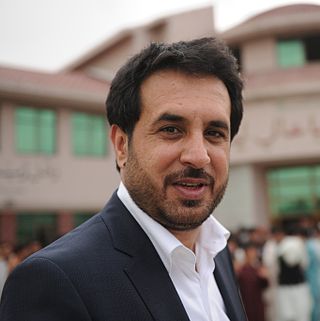
Asadullah Khalid is a politician in Afghanistan. He served as head of the National Directorate of Security (NDS), which is the domestic intelligence agency of Afghanistan. Before his appointment as the head of the NDS in September 2012, Khalid served as the Minister of Tribal and Border Affairs. Between 2005 and 2008, he was the Governor of Kandahar Province and prior to that as Governor of Ghazni Province (2002-2005). From 2018 until 2021 he was the Minister of Defense. Khalid is said to be affiliated with the Islamic Dawah Organisation of Afghanistan and has been noted as one of many loyalists of Afghan President Hamid Karzai.
Taj Mohammad Wardak is an Afghan politician. An ethnic Pashtun, he spent some of the period of the Taliban's administration in the United States of America, and became an American citizen.

Afghanistan–Pakistan relations refer to the bilateral ties between Afghanistan and Pakistan. In August 1947, the partition of British India led to the emergence of Pakistan along Afghanistan's eastern frontier, and the two countries have since had a strained relationship; Afghanistan was the sole country to vote against Pakistan's admission into the United Nations following the latter's independence. Territorial disputes along the widely known "Durand Line" and conflicting claims prevented the normalization of bilateral ties between the countries throughout the mid-20th century. Various Afghan government officials and Afghan nationalists have made irredentist claims to large swathes of Pakistan's territory in modern-day Khyber Pakhtunkhwa and Pakistani Balochistan, which complete the traditional homeland of "Pashtunistan" for the Pashtun people. Afghan territorial claims over Pashtun-majority areas that are in Pakistan were coupled with discontent over the permanency of the Durand Line which has long been considered the international border by every nation other than Afghanistan, and for which Afghanistan demanded a renegotiation, with the aim of having it shifted eastward to the Indus River. During the Taliban insurgency, the Taliban has received substantial financial and logistical backing from Pakistan, which remains a significant source of support. Nonetheless, Pakistan's support for the Taliban is not without risks, as it involves playing a precarious and delicate game. Further Afghanistan–Pakistan tensions have arisen concerning a variety of issues, including the Afghan conflict and Afghan refugees in Pakistan, water-sharing rights, and a continuously warming relationship between Afghanistan and India, but most of all the Taliban government in Afghanistan providing sanctuary and safe havens to Pakistani Taliban terrorists to attack Pakistani territory. Border tensions between Afghanistan and Pakistan have escalated to an unprecedented degree following recent instances of violence along the border. The Durand Line witnesses frequent occurrences of suicide bombings, airstrikes, or street battles on an almost daily basis. The Taliban-led Afghan government has also accused Pakistan of undermining relations between Afghanistan and China and creating discord between the neighbouring countries.
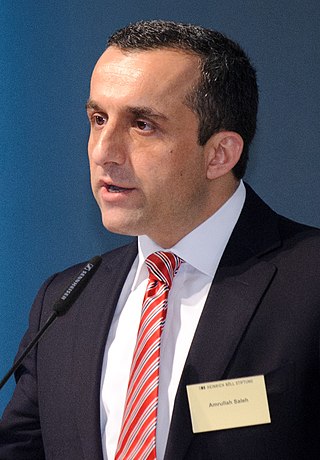
Amrullah Saleh is an Afghan politician who served as the first vice president of Afghanistan from February 2020 to August 2021, and acting interior minister from 2018 to 2019. He was the head of the National Directorate of Security (NDS) from 2004 to 2010.

Abdul Ghani Baradar is an Afghan militant and religious leader who is the acting first deputy prime minister, alongside Abdul Salam Hanafi, of the internationally unrecognized post-2021 Taliban regime in Afghanistan. A co-founder of the Taliban along with Mullah Omar, he was Omar's top deputy from 2002 to 2010, and since 2019 he has been the Taliban's fourth-in-command, as the third of Leader Hibatullah Akhundzada's three deputies.
Mohammed Zia Salehi is the chief of administration for the National Security Council in Afghanistan. He was previously an intelligence officer and in 2004 was appointed head of administration for the National Security Council. He was a trusted advisor and aid to the president of Afghanistan, Hamid Karzai.

Mullah Noorullah Noori is a militant and Minister of Borders and Tribal Affairs of the Islamic Emirate of Afghanistan since 7 September 2021. He was also the Taliban's Governor of Balkh Province during their first rule (1996–2001). Noori spent more than 12 years in the United States's Guantanamo Bay detention camps, in Cuba. Noori was released from the detention camp on May 31, 2014, in a prisoner exchange that involved Bowe Bergdahl and the Taliban Five, and flown to Qatar.

The Afghanistan night raids were a military tactic employed by the United States and Afghan special forces during the War in Afghanistan that lasted from 2001 to 2021. The coalition forces in Afghanistan maintain the Joint Prioritized Effects List (JPEL) of targets their special forces try to capture or kill. Using night vision equipment, US and Afghan special forces would raid the suspected households of targets on the Joint Prioritized Effects List. The operations were controversial, due to issues like civilian casualties.
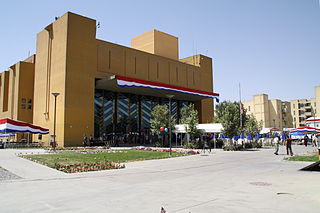
The April 2012 Afghanistan attacks took place on Sunday, 15 April 2012, at around 13:00 local time when heavily armed Taliban insurgents and suicide bombers launched multiple coordinated attacks throughout Afghanistan. Insurgents launched the 2012 spring offensive on multiple locations, including government buildings, military bases, and embassies. Attacks occurred in four Afghan provinces, including Kabul and Paktia. Different reports attribute responsibility for the attacks to either Taliban or the Haqqani network although the Taliban have claimed responsibility.

Presidential elections were held in Afghanistan on 5 April 2014, with a second round held on 14 June. Incumbent President Hamid Karzai was not eligible to run due to term limits. The registration period for presidential nominations was open from 16 September 2013 until 6 October 2013. A total of 27 candidates were confirmed to be running for office. However, on 22 October Afghanistan's Independent Election Commission disqualified 16 of the candidates, leaving only 11 in the race. By April 2014 three candidates gave up the race and decided to support some of the eight remaining candidates. Opinion polls showed Abdullah Abdullah and Ashraf Ghani as the front-runners and indeed the results of the first round of the election had Abdullah in the lead and Ghani behind him. The second set of results came after the run-off on 14 June, two months after the first round. Preliminary results were expected on 2 July and the final result on 22 July. However, widespread accusations of fraud delayed these results. As a result, John Kerry, then United States Secretary of State, mediated the negotiations between the two final candidates, Ghani and Abdullah. After a series of negotiations and talks between Ghani, Abdullah and Kerry, the two candidates agreed to sign an Agreement to form a National Unity Government based on 50–50 power sharing. As a result of that political agreement, a separate position was created for Abdullah as Chief Executive. The National Unity Government's term ran out after the next Afghan presidential election was held in September 2019.
The Taliban Five were five Afghan detainees at Guantanamo Bay and former high-ranking members of the Taliban government of Afghanistan who, after being held since 2002, indefinitely without charges, were exchanged in 2014 for United States Army sergeant Bowe Bergdahl.
References
- ↑ Paul Watson (2004-10-22). "Taliban Faction Seeks Return to Power by Ballot". Los Angeles Times . p. A1. Archived from the original on January 31, 2013. Retrieved 2012-03-12.
The negotiations are so sensitive that Karzai put his trusted brother-in-law Mohammed Ibrahim Spinzada -- known as "Engineer Ibrahim" in intelligence ...
- ↑ Kenneth Katzman (2011-02-10). "Afghanistan: Politics, Elections, and Government Performance" (PDF). Congressional Research Service . Retrieved 2012-03-12.
There is a National Security Council that is located in the presidential palace complex and heavily populated by ethnic Pashtuns. As of February 2010, it has been headed by former Foreign Minister Rangin Spanta, a Pashtun who was in the government during the Soviet occupation era and is said to retain leftwing views. Two other trusted NSC officials (both Pashtuns) are first deputy NSC Adviser Ibrahim Spinzada (a Karzai brother-in-law), and Shaida Mohammad Abdali, the second deputy NSC Adviser.
- ↑ Hamid Shalizi, Jonathon Burch (2010-06-06). "Afghan minister and intelligence chief quit over attack". Reuters. Archived from the original on 2016-03-13. Retrieved 2012-03-12.
The statement from Karzai's palace said the president had appointed Paswal Mohammad Munir Mangal as acting Interior Minister and Engineer Ibrahim spinzada as acting head of the intelligence department.
- ↑ Hamid Shalizi (2012-03-10). "Taliban Guantanamo detainees agree to Qatar transfer - official". Reuters. Archived from the original on 2012-03-12. Retrieved 2012-03-12.
Karzai's top aide, Ibrahim Spinzada, visited the Guantanamo facility this week to secure approval from the five Taliban prisoners to be moved to Qatar.
- ↑ "Karzai aide paid by CIA: Presidential aide allegedly paid by CIA helps elites funnel money out of the country". Al Jazeera. 2010-08-26. Archived from the original on 2012-03-15. Retrieved 2012-03-12.